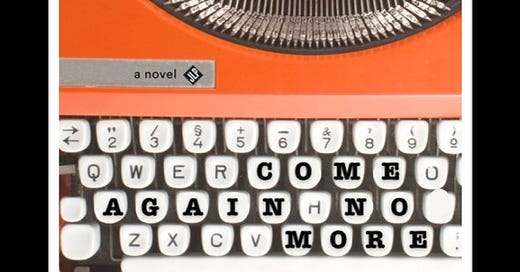Cover reveal, excerpt: COME AGAIN NO MORE (forthcoming from JackLeg Press)
A ‘beguiling blue yodel’ of a novel, says Steve Stern; read an excerpt below
My new novel, COME AGAIN NO MORE (JackLeg Press, Nov. 10, 2025), has a cover — and you can judge the book by it. Sort of. It’s my newspaper novel, set long after the days when the clatter of typewriters filled newsrooms (and newsrooms were filled with journalists), but very much pining for those times.
Here’s a short description:
Meet Charley Hull, erstwhile newspaper reporter, latest casualty of a dying industry, and the voice of David Wesley Williams’s most personal and poignant novel yet. Come Again No More is an elegy with heart and gallows humor, told in Charley’s lyrical and oft-profane voice. It begins with a wake and ends with a rebirth, and in between we see Charley confront the man who fired him, comfort himself with entirely too much bourbon and song, and cope with what’s left of a life given to a job he’s loved and lost. Along the way we meet Charley’s colleagues, from the old columnist Madison, a bulldog of a reporter who wrote—and drank—like an Irish poet, to the talented young James Ricketts, whom Charley fears will “do something romantic” like throw himself into the Mississippi River. One will die by his own hand, but Charley bottoms out and gets back up, with the help of old friends and a new love. Come Again No More is Southern literature with shades of Charles Portis (like Charley Hull, and the author, a former Memphis newspaper reporter), but also with a whiff of the Irish to it—think the playful language and place-as-character of Joyce’s Ulysses (“Good puzzle would be cross Memphis without passing a barbecue joint.”) or the riotous blasphemy of Roddy Doyle’s Barrytown books.
Sound like your kind of novel? Something for the (erstwhile) journalist in your life? Did I mention that it’s quite profane, and (I’m told) funny?
Steve Stern (O. Henry Prize winner; author of THE VILLAGE IDIOT and the forthcoming A FOOL’S KABBALAH) calls it “a beguiling blue yodel oscillating between heartache and hilarity.”
Bryan Denson (former newspaper reporter and Pulitzer Prize finalist, and author of THE SPY’S SON) says it’s “so lyrical and lovingly drawn — and spit-take funny — that the ghost of William Faulkner might just throw rocks at his best work.”
I don’t know about all that. But anyway, presale begins July 1 and the publication date is November 10.
Until then, here’s an excerpt from the opening chapter, set during a wake for the latest sacked journalists:
“But God forbid they’d say the word,” I said.
“What word’s that, Charley?”
I was sitting at the bar, two beers into the wake. It was Francis the bartender. Saint Francis, we called him. Patron Saint of the Pour. He slid another pint glass across the bar to me. Rim of foam at the lip. Perfection. He knew what I was about to say. He waited for me to say it. He knew I needed to.
“Fired,” I said.
“Sure. Fired, of course, Charley. The other f-word.”
“I made a scene of myself, Francis. I banged the table. I did everything but beg. I may have begged. But he wouldn’t say the fucking word.”
“The editor in chief, you mean.”
“He said it wasn’t the term they use. I said we don’t use terms. We’re newspaper people. We say things, straight out. We don’t flinch. When some poor son of a bitch dies, we don’t say he passed. We don’t say he went to his great reward. We don’t presume destination, just pass along the facts as they are: We say the poor son of a bitch died.”
“I’d have fired you, Charley,” Francis said, smiling as he poured another. There wasn’t anyone there to drink it, but there would be. He kept them coming.
“You’re a good man,” I said. “Veritable saint.”
Pearl joined us.
“Did the son of a bitch tell you it wasn’t personal, Charley?” he said.
Arthur Pearl was my favorite photographer. He didn’t think he was a fucking artist, like some photographers. He thought like a reporter. He worked like one too, always digging, his camera a tool. Detail man. Clean lines, master of the telling expression. Some photographers could put their subjects at ease, but Pearl could disappear altogether. I don’t guess I ever worked with a better one. But they sacked him, all the same.
“He did, Arthur. I was waiting for it, too. I said, ‘If it wasn’t personal it would have been somebody else.’ ”
“It was, Charley,” Pearl said. “Me.”




